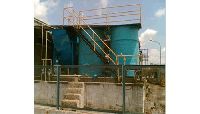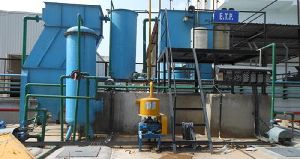
Effluent Treatment Plant
Get Price Quote
Description: With intention the best quality of Mineral Water, E-flocx is an accelerated electrocoagulation system which destabilises dissolved, colloidal , emulsified and other stable compounds in water and converts them into suspended particles. These suspended particles get removed on filtration and result in completely colourless, odourless and reusable water.Eflocx has proven to be a very versatile process able to handle large variety of wastewaters of different volumes. Working principle: With intention the best quality of Mineral Water, The process works on the principle of controlled dissolution of charged ions in water. These charged ions on contacting various pollutants like suspended solids, bacteria, organics, heavy metals etc. neutralize them and coagulate them.These coagulated solids are subsequently filtered using suitable filtration equipment. Features of Eflocx: Eflocx is a state of the art technology designed for today's time Eflocx technology can lead to lot of saving on space vis a vis conventional technology There are significant savings on labour, chemical cost and electrical power. As the process is not based on moving parts there is low maintenance except routine replacement of electrodes. The systems are modular in nature hence expansion and modification is easily possible. The system is portable in nature and thus can be shifted and transported in case the industry is being relocated. The operating cost of system is in the range of Rs. 5 to Rs. 15 per kilo liter (1000 litres) depending on the wastewater characteristics. Advantages of Eflocx compared to conventional systems: E-Flocx System Conventional System Low space compared to conventional systems and less holding capacity required due to continuous treatment Floor space required is significantly higher as holding capacity of tanks needs to be high due to batch treatment. 70-80% Less sludge production compared to conventional systems. Sludge produced is like a dry cake and very easy to handle. Large quantities of wet sludge produced which is difficult to handle and additional space is required for sludge drying bed, which is not very effective No additional chemicals required Chemicals are required for coagulation and flocculation, chemical handling and storage requires manpower and additional space Significant saving on civil work cost as civil work construction is minimal compared to conventional systems. Civil work construction is very extensive due to construction of holding tanks, settling tanks, aeration tanks, secondary clarifiers, sludge drying beds etc. Can easily handle shock loads of effluents by changing current density or flow rate Shock loads of effluents will not be handled by conventional systems. Modular in nature. Very convenient to scale up capacity with additional units. Not modular in nature. Once installed, scaling up capacity is not possible. Completely automated systems Manual systems with little scope of automation requiring dedicated manpower Industrial applications: Textile Process Effluent Sewage treatment plant Water Jet Loom. Electroplating industry Tannery Food processing and Dairy Metal processing Automobile service station Yarn Dyeing Industry

Effluent Treatment Plant
Get Price Quote
The Effluent Treatment Plant is designed to treat the effluent i.e. waste water recycling coming from different areas of the plant. Water is one of the most important components used in all type of industry. It may be used for washing, cooling, heat exchanging, condensing the steam etc, But water used in industry is not totally consumed. Hence almost all industries generate waste water from industries that needs serious action. So, improper discharge of water can pollute local environment. In many manufacturing industries, by- product can be treated as waste water called “effluent” should be treated before it is released into the environment. Effluent is an outflow of water or gas from a natural body of water, or from a human made structure. Effluent, in engineering, is the stream exiting a chemical reactor. Effluent is defined as treated or untreated waste water that flows out of a treatment, sewage or industrial outlet. So this treatment of waste water i.e. untreated effluent is turned into treated effluent with the help of Effluent Treatment Plant. Clean water is then safely discharged into the environment. Effluent Treatment Plant can be operated with the help of 4 different ways: Preliminary Treatment – Removal of Solids, oil & Grease. Primary Treatment- removal of floating & settable such as suspended solids, organic matter. Secondary Treatment-Removal of biodegradable organic matter. Tertiary Treatment- Removal of residual suspended solids, dissolved solids
Best Deals from Effluent Treatment Plant

Waste Water Treatment Plants
Get Price Quote
Waste Water Treatment Plants, Food Machinery, Heat Pump, Heat Exchanger

Effluent Treatment Plants
Get Price Quote
Effluent Treatment Plants, Water Treatment Plants, water purifying chemicals

Water Treatment
Get Price Quote
Water Treatment, Laboratory, MANUAL DISHWASHING LIQUID SOAP, Liquid Hand Wash